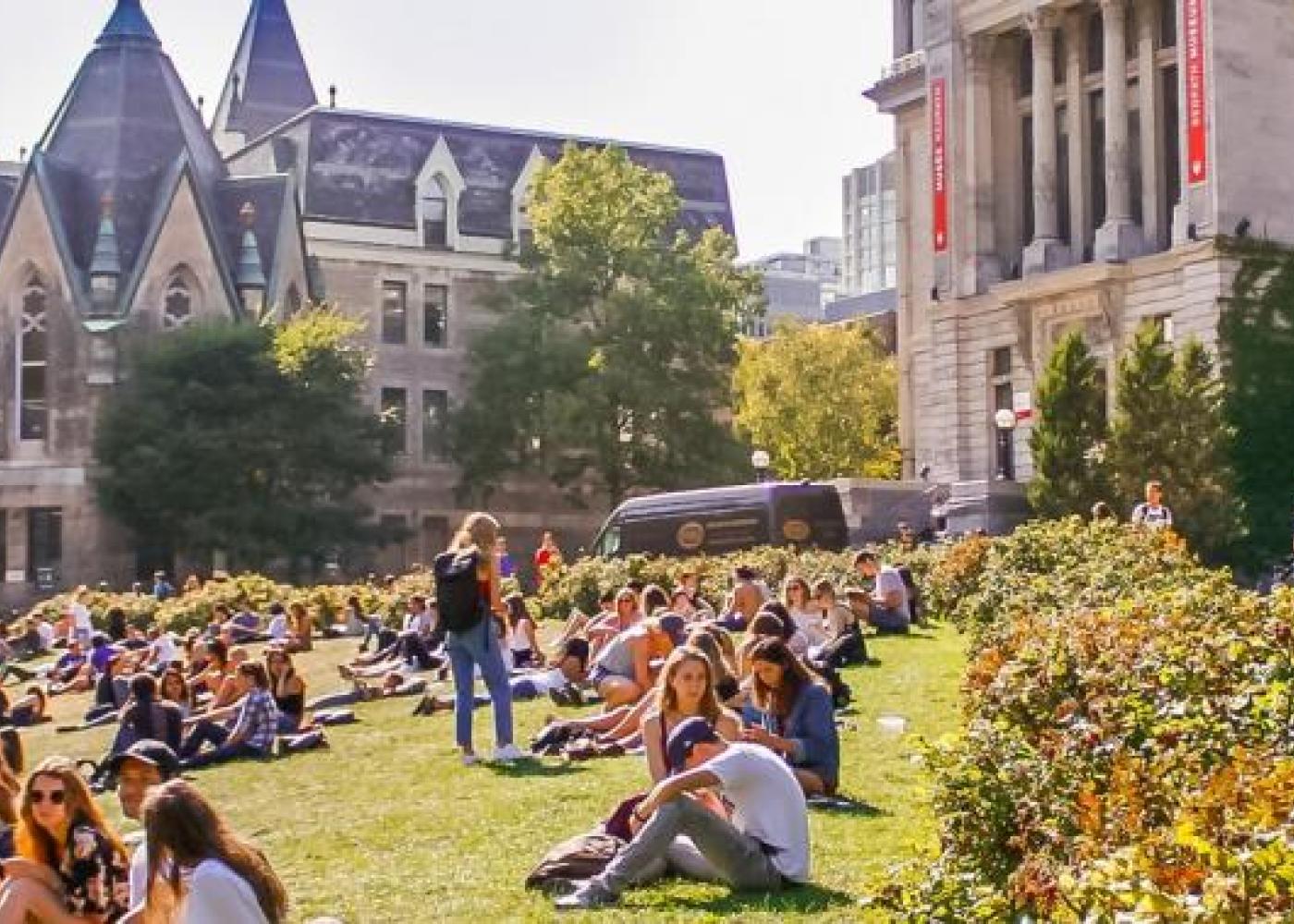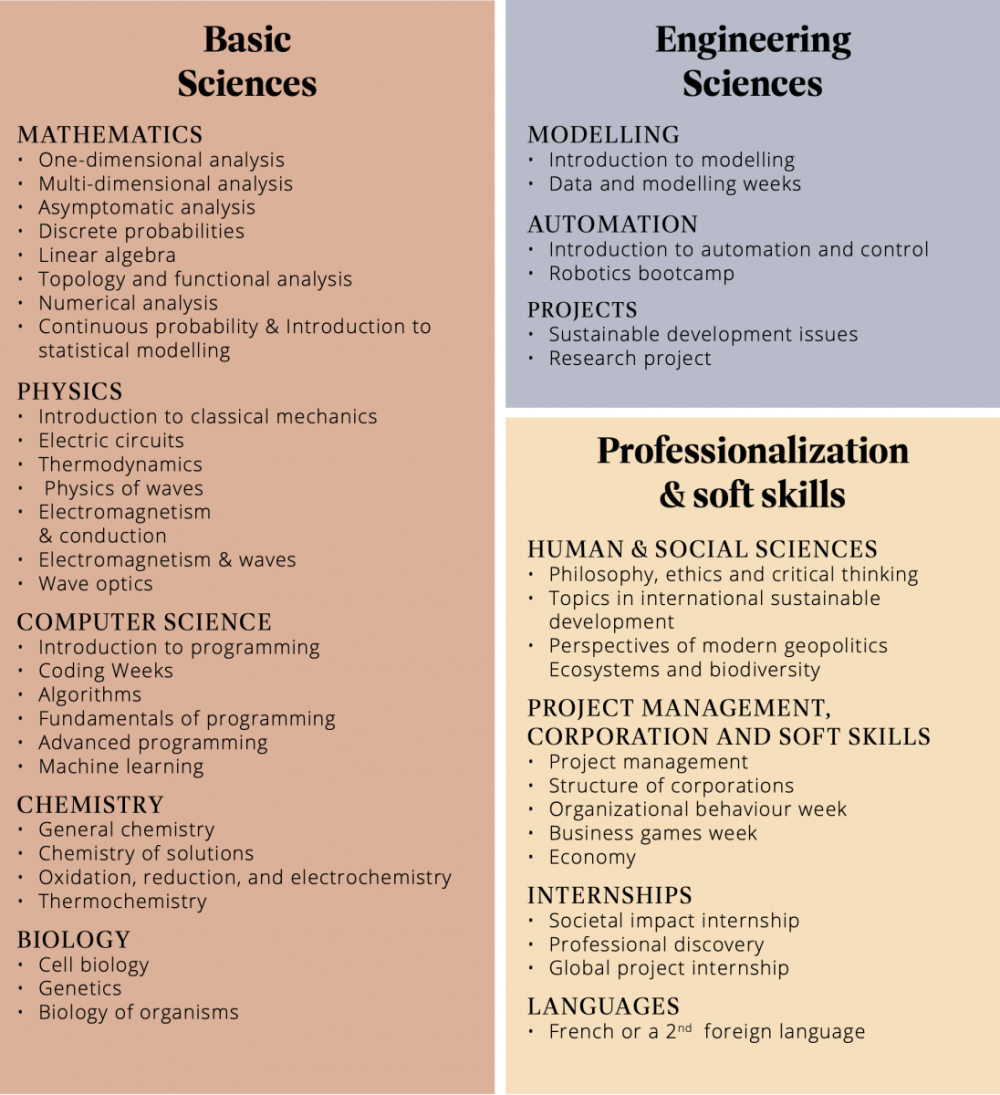Bachelor of Engineering – CentraleSupélec & McGill
A joint undergraduate program between CentraleSupélec and McGill University’s Faculty of Engineering.

This program represents the best of these two top universities worldwide, while benefiting from a completely remastered pedagogy and spirit. Beyond the excellence of the curriculum, graduates of this program will have the tools to face the most burning challenges of both today and tomorrow, and will be ready to have be impactful within companies, while being aware of sustainability and social challenges. Faculties, politics and key players in the industry are pushing for this Bachelor, for a new program that trains well-rounded engineers, with an international exposure.


About
The Bachelor in Global Engineering is a joint undergraduate program between CentraleSupélec and McGill University’s Faculty of Engineering.
Over the course of four years, an international cohort will study an intensive and multidisciplinary engineering curriculum taught in English within a French-speaking culture. Students spend two years at CentraleSupélec, where they follow a common curriculum and benefit from the French excellence in mathematics and science within a Grande École. They then spend two years at McGill, specializing in one of the 9 streams offered as part of the program. This new joint program aims at tackling the challenges of the modern world: environmental, societal, and corporate challenges. The curriculum mixes the best of the two systems, develops scientific excellence and best practices for global engineering (in both the multicultural and multidisciplinary sense).
Beyond the strong curriculum, students will enjoy two very different campuses. CentraleSupélec is just 20km away from Paris, in the heart of the “French Silicon Valley,” and the campus hosts numerous sport facilities and student clubs. McGill is in heart of downtown Montreal, one of the most multicultural and vibrant cities in the world.
Upon graduation, students will have the opportunity to join industry, in a broad spectrum of capacities (by working for consulting or engineering firms, or as an entrepreneur), or to continue their studies at the master’s level in France, Canada, or anyother top university.

CentraleSupélec
CentraleSupélec has historically strong ties to business and industry, as well as a solid career track. The school presents itself as a pioneer and a leader in engineering in France and in Europe, and the Global Bachelor is only one of many examples. Coming to CentraleSupélec is choosing to live on a stimulating, large, and calm campus not far from Paris.
CentraleSupélec is a founding member of the Université Paris-Saclay. It brings together some of the best French Higher Education institutions, alongside many companies and public research centers, in order to create the “French Silicon Valley.” Today, Université Paris-Saclay is ranked 12th worldwide (Shanghai ranking, 2024), being 2nd in mathematics, 3rd in Physics and top 50 in 10 topics.
McGill University’s Faculty of Engineering
McGill’s campus is in the heart of Montreal and embodies the “global” aspect of the program. Students will benefit from a multicultural and bilingual city, and enjoy a place in which it is esay to live, alongside a top-notch culture and nightlife. During the two years at McGill, students will be among the 40,000 students majoring in any topic, from business, to pure mathematics, including engineering, politics, medicine, or languages.
McGill undergraduates have the highest average entering grades of any Canadian university. McGill is always ranked in the top 3 nationwide, and this will make you part of a stimulating community seeking excellence, where you will be able to benefit from McGill expertise to major and subsequently be ready to enter the corporate world or continue your studies.

-
This Bachelor aims at reinventing undergraduate engineering programs. It was created around a strong set core of values: excellence, multiculturalism, and sustainable, social and corporate impact.
We summarize the spirit of the training offered by the Global Bachelor of Engineering with the word “global.” On the one hand, it involves exposing young people to different cultures, through the international cohort and through the two countries visited. On the other hand, it involves training engineers with a strong multi and interdisciplinary core training, by exposing them to today’s engineering and corporate challenges, with a specialization in one of 9 important streams.
This program was designed for a fast-changing world, to address corporations’ needs for engineers, and to train future leaders. Over and above a classic engineering curriculum, students will develop and further study relevant issues and develop critical skills during the four years, including climate change, new technologies, digitalization and programming, innovation, complex problem solving, team work, interculturality, communication, corporate behaviour, and analytical capabilities.
-
Given that no student has yet graduated from the program, we cannot provide data on future career paths of the program’s graduates. Based on statistics of McGill graduates, 60% continue their studies beyond the bachelor’s degree. They will be competitive candidate for admission to the best masters programs around the world, in engineering, as well as other disciplines. Of course, graduates of the program will be able to apply to graduate school at McGill or in accelerated tracks at French engineering schools, including CentraleSupélec. Students in the program will graduate with 240 European Credits (ECTS), recognized all around Europe, allowing them to pursue masters in M1 or in certain cases directly M2.
The program was designed to address companies’ needs in the context of globalization. Graduates from the program thus will be readily accepted into companies in France, in Canada, but also around the world, from start-ups to multinationals, as well as companies in between .
Program
The Bachelor in Global Engineering by CentraleSupélec and the Faculty of Engineering of McGill aims at bringing together the best that systems and institutions have the best to offer. Classes at both universities follow the same objectives of excellence and interdisciplinarity. CentraleSupélec can rely on the one hand on its experience and innovations in teaching engineering and, on the other hand, the Classes préparatoires rigour. McGill classes will all be already existing classes, and students will choose their classes within a given framework.
The classes at CentraleSupélec will match the Classes préparatoires rigour, but the spirit is entirely different. Students do not prepare for competitive examinations but follow classes to better choose their major for the last two years, giving them a broad scientific culture. The goal is to give them the best tools to succeed in any engineering field offered within the streams at McGill.
-
Every year will be unique, you won't have the time to be bored during this Bachelor! During the four years that the program lasts, outside of classes, students will have the opportunities to do an internship with a company and to deepen their knowledge of sustainable development and social challenges.
At CentraleSupélec, the academic year is divided into four sequences. Shorter periods mean fewer classes at the same time and the opportunity to focus better and go in-depth on those topics. Each sequence lasts for six weeks, and between them, there are one or two-week projects or intense courses.
Calendar example for Year 1 (CentraleSupélec)
Arrival on campus at the end of August, followed by two orientation weeks.
- Classes from the middle of September to beginning of June. Examination periods last one week, and occur at the end of October, middle of January, end of March. and middle of June,. Project weeks follow each examination period.
- One-week periods of vacation take place at the beginning of November, middle of February, middle of April, long with a two-week winter break. The vacation periods correspond to the 1st week of the national French vacations in schools and higher education for Paris (“vacances Zone C”).
- An optional two-week summer school on sustainable development takes place at the end of June / beginning of July.
- A five-week “Social impact” internship takes place during the summer (mandatory)
At McGill, the academic year is divided into two semesters. The calendar of the Bachelor is established on McGill’s and North American standards. During the summer, students are required to do an internship at a company.
Calendar example at for Year 3 (McGill)
- Classes from end of August to end of April. Examinations in December, and at the end of April
- A 3-day mid-semester break in October, a week-long spring break in March, and a two-week winter break.
- The Global Project internship (mandatory) and the second summer school on sustainable development challenges (optional) occur after Year 3.
-
The first two years at CentraleSupélec are divided in 8 sequences, where a class lasts for one sequence. The curriculum is very generalist in terms of topics: mathematics, physics, computer science, biology, chemistry, and social sciences. Below is the detail of the projects and topics for each sequence. The format mixes a traditional university and an intensive preparatory program: it offers intellectual and academic freedom, a close-knit cohort, and small class sizes. The teaching staff will include instructors from elite French preparatory programs, university faculty, researchers, and PhDs from CentraleSupélec. In mathematics, the same professor will teach all the classes throughout the year, and the same applies to physics. This structure allows for better continuity and personalized supervision of students. There is a one- or two-week project at the end of each teaching sequence.
Basic Sciences
MATHEMATICS
- One-dimensional Analysis
- Multi-dimensional Analysis
- Asymptomatic Analysis
- Discrete Probabilities
- Linear Algebra
- Topology and Functional Analysis
- Numerical Analysis
- Continuous Probability & Introduction to Statistical Modeling
PHYSICS
- Introduction to Classical Mechanics
- Electric Circuits
- Thermodynamics
- Physics of Waves
- Electromagnetism and Conduction
- Wave Optics
COMPUTER SCIENCE
- Introduction to Programming
- Coding Weeks
- Algorithms
- Fundamentals of Programming
- Advanced Programming
- Machine Learning
CHEMISTRY
- General Chemistry
- Chemistry of Solutions
- Oxidation, Reduction and Electrochemistry
- Thermochemistry
BIOLOGY
- Genetics
- Cell Biology
- Introduction to Bioengineering
Engineering Sciences
MODELING
- Introduction to Modeling
- Data and Modelling Weeks
AUTOMATION
- Introduction to Automation and Control
- Robotics Bootcamp
PROJECTS
- Sustainable Development Issues
- Research Project
Professional Development & Soft Skills
HUMAN AND SOCIAL SCIENCES
- Philosophy, Ethics and Critical Thinking
- Topics in International Sustainable Development
- Perspectives of Modern Geopolitics Ecosystems and Biodiversity
- Ecosystems and biodiversity
PROJECT MANAGEMENT, CORPORATION AND SOFT SKILLS
- Project Management
- Structure of Corporations
- Economics
- Organizational Behavior Week
- Business Games Week
INTERNSHIPS
- Social and Environmental Community Internship
- Enterprise Discovery Internship
LANGUAGES AND COMMUNICATION
- French as a Foreign Language or Professional Communication Modules
Image
-
The last two years are spent at McGill and students follow one of the nine streams offered in the Global Bachelor: Breadth, Bioengineering, Chemical engineering, Civil engineering, Data science, Electrical engineering, Entrepreneurial, Materials engineering, Mechanical engineering. All the classes are already offered in existing undergraduate majors at McGill Faculty of Engineering.
-
Students in the Breadth stream receive a diverse scientific education that covers a wide range of subjects and fields. This multidisciplinary program allows students to acquire fundamental knowledge in all engineering disciplines, complemented by elective courses on sustainable development, as well as additional courses in the humanities and social sciences. The training provided to students in the Breadth stream will prepare them for careers requiring the supervision and management of various technical teams, projects and organization, whether in industry, government, or non-governmental organizations.
-
Bioengineering takes advantage of the sophistication of living systems as both a source of inspiration as a tool for design and creation. It is a rapidly growing discipline that covers a wide range of topics such as materials science and tissue engineering, biomedical devices and instruments, molecular and cellular engineering, and environmental and environmental engineering. Bioengineering is unique in that it combines the fundamental principles of engineering with biology. Therefore, bioengineers must acquire a strong background in mathematics, physics and chemistry.
Bioengineers can work in many different fields, including pharmaceutical industry, medical devices, public health, bioenergy and agricultural biotechnology. As bioengineers acquire, through their studies, the complementary skills needed to be good project managers, they can also access to management and executive positions.
-
Chemical engineers design, operate, model, and optimize a variety of systems and processes. They produce new products and technologies to support population growth and meet the world's increasing demand for natural resources around the world. What a chemist can produce in a test tube, a chemical engineer chemical engineer can produce by the ton while ensuring that the process is as efficient as possible, as well as sustainable and environmentally friendly. To do so, efficient and efficient and effective systems are needed. Therefore, chemical engineers are involved in the entire life cycle of products, from raw material extraction to recycling and safe disposal, through processing and integration into commercial goods and equipment.
A chemical engineering education provides students with the skills and experience to design, optimize, and operate production and manufacturing systems as well as to manage production and manufacturing systems, but also to manage a team or a company in its human, financial and financial and economic dimensions. Chemical engineers therefore work in many fields, including pharmaceuticals, biotechnology and medical devices, pulp and paper, food and beverage processing, petrochemicals, energy, advanced materials, mining, environmental engineering and production and manufacturing. They are involved in creating efficient, safe and sustainable processes from an economic, societal and environmental perspective. This includes the development of cleaner, more energy-efficient fuels, as well as waste treatment and disposal methods.
-
The civil engineering program trains engineers with varied profiles who create the infrastructures of modern society, from roads to water management to the buildings in which we live in. Environmental engineers ensure the sustainable development of water, land and air resources while minimizing the impact on our environment, climate and our public health. Geotechnical engineers study the behavior of soils under the influence of load forces to stabilize foundations. Water resource engineers quantify and manage the components of the hydrological cycle such as precipitation, river flow precipitation, river flow and groundwater dynamics. Structural engineers
design, analyze, draw and construct buildings and bridges that can resist loads from internal and external forces. Transportation engineers plan, design, build, operate and maintain transportation systems ensuring the safe, efficient and convenient movement of people and goods.
Civil engineering graduates use and develop modern technologies to meet the needs of our ever-changing society. Concerns about the quality of the environment, climate change, energy saving, infrastructure rehabilitation, waste reduction infrastructure rehabilitation, waste reduction and public safety are now shaping the role of civil of civil engineers. As a result, civil engineers work in a variety of fields, including construction, transportation, renewable energy, manufacturing and process manufacturing and process engineering, materials science, financial services, and public works. Their problem-solving and communication skills make them excellent consultants, contractors, managers and executives.
-
Students in the Data science stream study algorithms, model-based programming methods, data structures, database systems, and artificial intelligence, to prepare them to manipulate, analyze, and draw conclusions from the multitude of large data sets that are collected in modern information. The skills they acquire can be applied to a multitude of areas, including applied to a multitude of fields, including cross-cutting areas.
The training provided to students in the Data science stream will prepare them to for jobs in a variety of industries, including artificial intelligence, information technology, management consulting, or any of the many sectors in which large data sets are in which large sets of collected data must be explored and studied.
-
The Electrical engineering stream provides a broad range of experience in a wide variety of topics, including electrical and electronic systems, as well as software and hardware design. Electrical engineers design and develop the electronic systems that underlie technologies such as autonomous vehicles, robotics, telephony, video games, telephony, video games, automation and home power.
Electrical engineering graduates are equipped to work in a wide variety of industries, including information technology, telecommunications, robotics telecommunications, robotics, medical technologies, biomedicine, automotive and aerospace industry, microelectronics and electronic systems, power systems and energy.
-
Students in the Entrepreneurship stream receive a broad technical education complemented by business and management training, all with a focus on entrepreneurship. In addition to a solid foundation in the engineering sciences, students take courses in entrepreneurship, business plan design, etc. The complete training provided to the students is designed to train engineers with the ambition to pursue a career as an entrepreneur, or capable of innovating within companies.
-
Materials engineers transform matter, producing and evaluating its properties (mechanical, electrical, optical, thermal, chemical, biocompatible, surface) using numerical models. They are trained to understand the relationship between structure and function of materials such as metals and alloys, ceramics, industrial minerals industrial minerals, polymers, and composite nanomaterials. Materials engineering students engineering students learn how steel and other materials are made, and their structure and properties can be adjusted. They may take advanced courses in topics such as aerospace materials, metallurgy and nano-fabrication.
Materials engineering education provides skills for a wide range of employment opportunities. Depending on their interests, graduates may work in mineral processing or metal production companies, be hired by engineering or management consulting firms to work on local and global projects, test and design materials for the aerospace, battery, or automotive industries. Their training also allows them to acquire cross-disciplinary skills such as problem solving, time management and teamwork.
-
Mechanical engineers work to design and operate systems in many aspects of life, from airplanes and space shuttles to bicycles and coffee machines. Typical application areas include aerospace, energy, apparel, machinery and transportation. The general nature of the discipline leads to a high demand for mechanical engineers, but some mechanical engineers go on to pursue other career paths, including sales, finance and sales, finance and management.
Mechanical engineers are curious about how things work and how to improve them. This includes devices - from airplanes to artificial hearts - but also processes such as energy conversion or production systems. They generally enjoy design, work in teams, and use math and physics to find creative new solutions to the problems around them. Mechanical engineers work in the design, manufacturing and operations units in countless industries, including aerospace, automotive, biomechanical, energy. Mechanical engineers often become excellent project managers or corporate executives.
-
Every stream count three humanities classes. The first one must be chosen among a given list of courses focused on the impact of technologies on society. The two other classes are to be chosen in a broader scope and can be related to social sciences, management, law, or humanities.
-
Admission
-
Applications are open.
High School students preparing for the French baccalaureate, or preparing for a French international baccalaureate, or preparing for their diploma in a French institution, and student who have had their French baccalaureate for less than one year, are invited to submit their applications on Parcoursup.
International and French applicants must submit their applications on the McGill University application platform. Please note that the deadline is either January 15, February 1st, or March 1st, 2026, depending on your location and the type of high school diploma you are pursuing (consult the McGill University application website to find out which date applies to you).
According to the platform's timetable, additional places will be available via Parcoursup for students preparing or obtaining the French baccalaureate.
If the application is successful, an interview is necessary to assess the student's motivation before admission.
- Step 1: To learn if the Bachelor of Global Engineering fits your academic strengths and interests and what documents to prepare, consult information on CentraleSupélec and McGill websites and read the tips below.
- Step 2: Connect on McGill platform to register and upload documents.
- Step 3: The application fee is 90€ and will be paid in euros (€). It is not refundable. Your application will not be considered until your payment is complete.
Link: McGill application website
The calendar for Parcoursup Round is:
- Application deadline: March 12, 2026, 11:59 PM Paris time
- Shortlisted results: between April 17 & 30, 2026
- Interviews: between April 27 & May 15, 2026
- Final admissions results: June 2, 2026
-
- Complete your application on a computer, not a smartphone.
- Monitor the email address you used to connect to this form because we will contact you using this address.
- This email address is also your UserID for connecting to the CentraleSupélec form.
- Review your application before submitting it.
- Remember that once you submit your application, you won't be able to log in and make any changes.
- Have a credit card handy when you submit your application.
- Your application will only be processed once the application fee is paid.
- Please ensure you have gathered all the necessary documents before continuing your application.
In addition to information about yourself, you will need to provide:
- Proof of identity: Passport or National Identification Card.
- Transcripts of your academic record for the years N, N-1, N-2 and N-3.
- Circumstances (where "N" is the current year).
- Your pre-university diploma, if you already have it, or a transcript of French Baccalaureate anticipated exams.
- A Personal Statement.
Information
- Please include an officially certified English translation if the documents you upload are not initially written in French or English.
- The documents must be merged in a single PDF file.
- Please note that fields marked with an asterisk (*) are mandatory.
- CentraleSupélec reserves the right to verify the accuracy of the documents provided.
- If you have any questions about the process that you did not find on the brochure or the website, please feel free to send an email to bachelors@centralesupelec.fr.
-
When a test of English proficiency is required, results must come directly from the examining institution to CentraleSupélec; applicants are not able upload the results. It is your responsibility to ensure official test results are submitted to CentraleSupélec.
CentraleSupélec's strong preference is to receive results electronically, directly from the issuing organization, when possible.
Please ensure you send us the institutional version of one of the tests listed below:
- McGill Certificate of Proficiency in English – Language and Culture or English for Professional Communication or Bilingual Professional Communication : Certificate awarded. For further information: School of Continuing Studies website.
- Cambridge C2 Proficiency (formerly Certificate of Proficiency in English (CPE)) : Please arrange for electronic results to be sent to McGill directly by Cambridge. Certificate awarded with a Grade C or better. For further information: Cambridge Assessment English website.
- Cambridge C1 Advanced (formerly Certificate in Advanced English (CAE)) : Please arrange for electronic results to be sent to McGill directly by Cambridge. Certificate awarded with a Grade B or better. For further information: Cambridge Assessment English website.
- Canadian Academic English Language Assessment (CAEL) : Overall band score of 70 or better; individual component scores of 60 or better. The paper (CAEL-Paper edition), the computer (CAEL-CE) and online (CAEL-ONLINE) tests are accepted. For further information: CAEL website.
- Duolingo English Test (DET) : Score of 125 or better (130 for B.Ed. (TESL), B.Com.) (updated September 2022).
For further information: englishtest.duolingo.com. - IELTS (International English Language Testing System) – Academic version : A band score of 6.5 or better; individual component scores of 6.0 or better. The regular Academic test and the test for UKVI are both accepted. For further information: ielts.org.
- Pearson Test of English – Academic : Overall score of 65 or better; individual component scores of 60 or better. For further information: PTE Academic website.
- TOEFL (Test of English as a Foreign Language) : Internet-based composite score (iBT) = 90. For further information: TOEFL website.
-
The Personal Statement is your motivation letter. As the name suggests, it is a personal letter in which you explain why you have chosen to apply for the CentraleSupélec - McGill Bachelor of Global Engineering.
Your Personal Statement reflects your personality and your ambitions. It should be sincere and authentic, and above all, unique. It simply explains your reasons for applying. You can justify this based on your academic background and extracurricular experiences.
If special circumstances may have affected your education, they should be mentioned in the Special Circumstances section.
It must be written in English and be at most two pages.
-
After your application is reviewed, you may be invited to a one-on-one interview to discuss your motivation and suitability for the program. This interview will be conducted via video link.
For each student, the objective of the interview is to evaluate:
- motivation to enter the CentraleSupélec - McGill Bachelor of Global Engineering.
- professional project (their motivation to become an engineer).
- knowledge of the program's operations.
- interest in international studies.
Finances
-
For the first two years, tuition fees will be paid in euros (€) at CentraleSupélec. For the two last years, fees will be paid in Canadian dollars ($) at McGill.
At CentraleSupélec
Tuition fees 2026/2027 are 44,000 €/year. Students from the European Union* (including the French) and Canadian students (including the Quebecois) benefit from a reduced rate: 13,000 €/year. Students with dual nationality pay the most advantageous rate.
Society & other fees (CVEC) : 103 €
Healthcare : if you are a foreign student or a French student born in New Caledonia or Wallis and Futuna, the steps to take according to your situation and those required to receive your healthcare reimbursements are explained here.At McGill
In years 3 and 4, tuition fees will be those on McGill website.
*Conditions and supporting documents to be produced for exemption from part of the registration fees for the international students for whom it is their first registration at CentraleSupélec are available in the document below.
-
Scholarships
As part of the McGill - CentraleSupélec partnership, you may be eligible for 2 types of scholarships.
- Merit-based award scholarships
- One-year entrance scholarship. The One-Year Entrance Scholarship is automatically considered with the application for admission.
- Major entrance scholarship is renewable annually up to 3 or 4 years provided criteria for renewal are met. Once you have validated your application, the site will provide you with a link to complete the Major entrance scholarship application.
- Need-based financial aid
- Entrance Bursary Program. When you receive an offer of admission, you will receive a link to complete the application for an Entrance Bursary Program.
You will receive information on the award decision. Recipients of McGill - CentraleSupélec scholarships must acquaint themselves with all regulations pertaining to both one-year and major entrance scholarships.
In addition, some financial aid may be targeted based on your nationality. Based on personal needs, tuition fees may be reduced for students benefiting of scholarships. You can find additional information in the following document.
Other scholarships
You may apply to other scholarships offered in France, in Canada, or in your country of origin. You can find scholarships offered by the French government on Campus France.
-
Housing
At CentraleSupélec, students of the Bachelor are strongly encouraged to live in the residence assigned to them, not too far from the campus. Access to rooms in the CESAL residence for bachelors and associated services is billed at 1,800€.
At McGill, students usually live off campus in Montréal. Possibilities at the McGill campus for the 3rd year will be offered.Living costs
To help with your financial planning, you can find below estimated expanses for students at CentraleSupélec and McGill.
At CentraleSupelec
Expenses
Price range
Accomodation on campus 650€ - 750€ / month Full meal at campus cafeteria 3.25€ Express subway train ticket to Paris 4.45€ Phone & data subscription 20€ /month Meal at typical Parisian bistro 25€ At McGill
Expenses
Price range
Accomodation on campus $650 - $1,100 /month Accomodation outside campus $500 - $1,300 /month Food on campus $15 /day Food outside campus $10 /day Other expenses $750 - $1,800 /month
Discuss with our students!

What’s it like to study at CentraleSupélec? When should you apply? How should you make your application stand out? Why should you join us?
And where will you be living? If you want to know more about CentraleSupélec, feel free to ask!
Drop a message to our students and ask them how it is to live in France and to be part of the CentraleSupélec student community.
Register with Unibuddy now and start chatting!